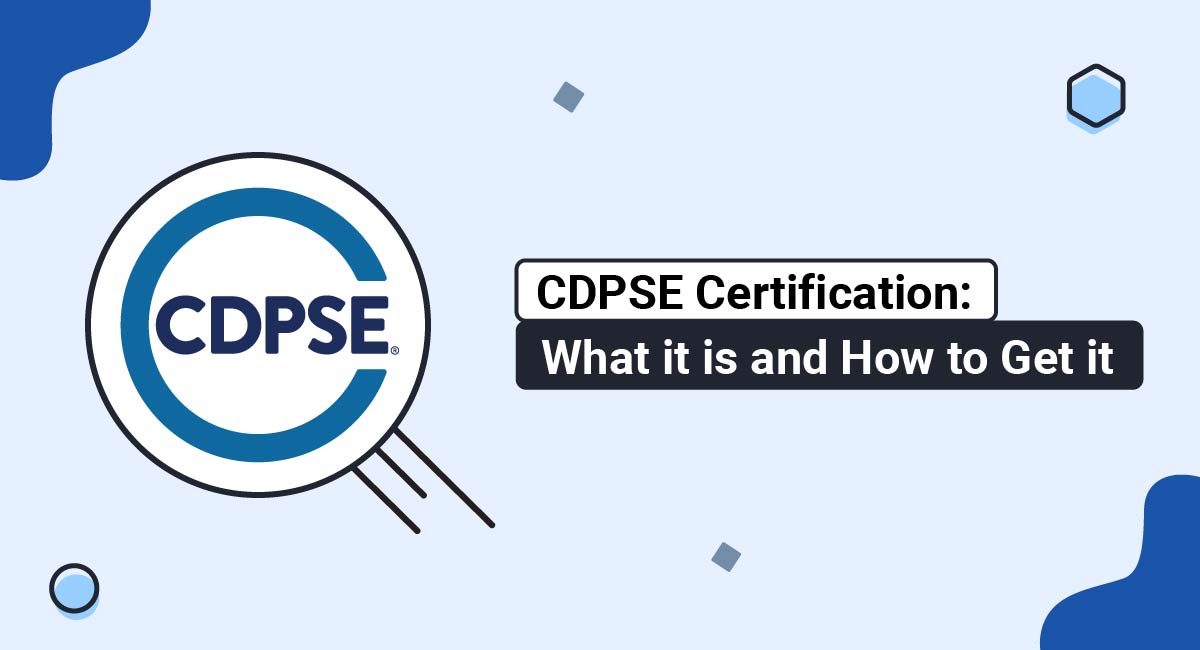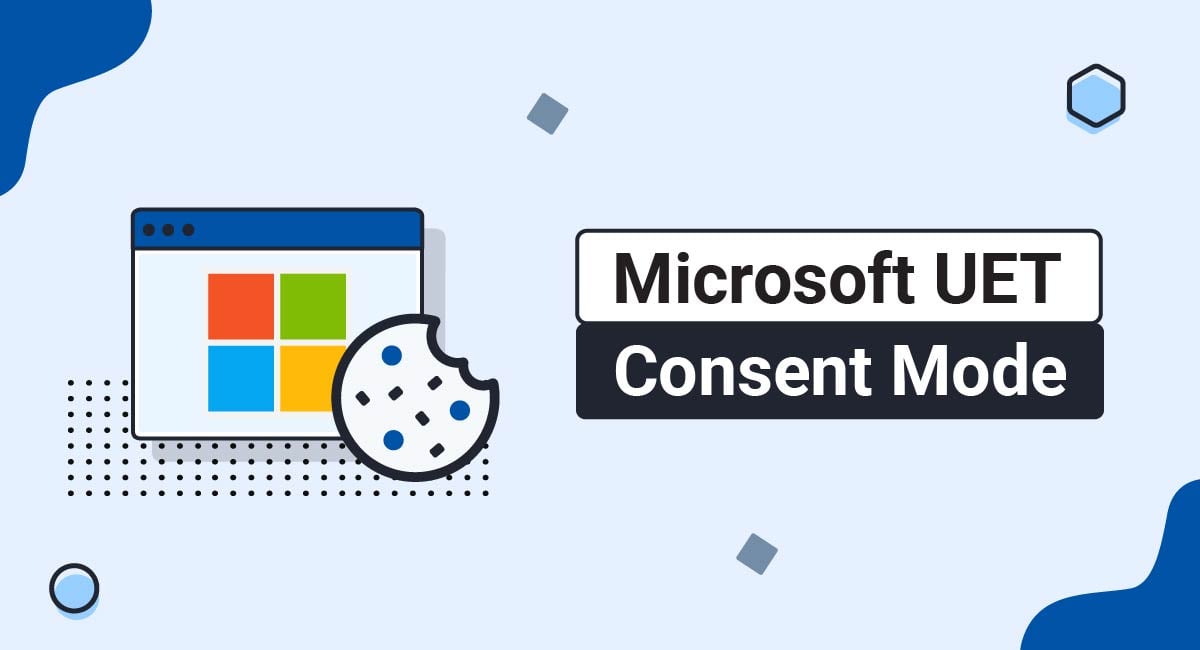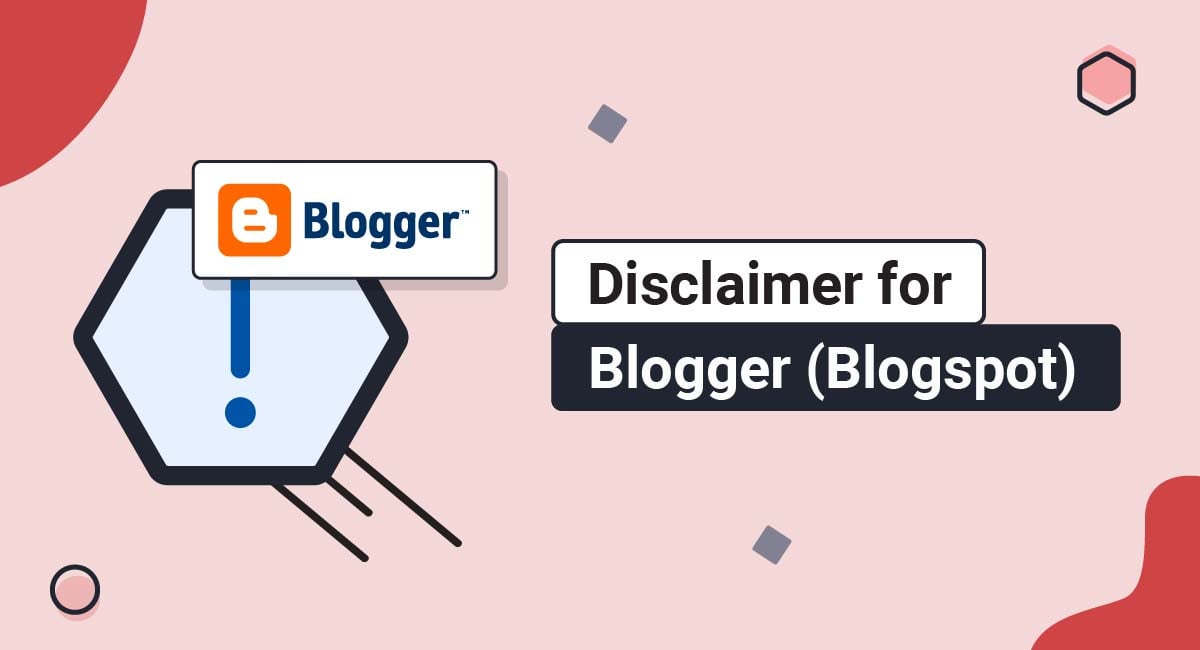Data privacy is a serious concern for all businesses. That's why there's a growing demand for cybersecurity professionals with the skills to keep data safe. Many professionals, however, lack the skills required to handle complex privacy laws or protect data from increasingly sophisticated criminals.
That's where certification, or education, becomes paramount.
If you want to prove that you have the skills to design, build, and implement comprehensive data privacy programs, then you might sign up for Certified Data Privacy Solutions Engineer (CDPSE) certification. But what is CDPSE certification, and is it worth the investment?
Below, we explain everything you need to know about CDPSE certification so you can decide whether it's the right choice for you.
- 1. What is CDPSE Certification?
- 1.1. What is Privacy By Design?
- 2. Who Offers CDPSE Certification?
- 3. What is the Purpose of CDPSE Certification?
- 4. Who Should Get a CDPSE Certification?
- 5. Is CDPSE Certification Required?
- 6. What are the Benefits of CDPSE Certification?
- 7. Who is Eligible to Obtain a CDPSE Certification?
- 8. How Long Does CDPSE Certification Take?
- 9. What is on the CDPSE Exam?
- 9.1. Domain One: Privacy Governance
- 9.2. Domain Two: Privacy Architecture
- 9.3. Domain Three: Data Lifecycles
- 10. How Do I Take the CDPSE Exam?
- 10.1. When Do I Get My CDPSE Exam Results?
- 10.2. Can I Retake the CDPSE Exam?
- 11. What is the CDPSE Code of Ethics?
- 12. Can a CDPSE Certificate be Revoked?
- 13. How Do I Prepare for the CDPSE Exam?
- 14. How Much Does CDPSE Certification Cost?
- 15. What are Some Job Prospects Following CDPSE Certification?
- 16. What are Some Average Salaries After CDPSE Certification?
- 17. Is CDPSE Certification Right for You?
- 18. Summary
What is CDPSE Certification?
CDPSE certification is a type of technical qualification offered by ISACA - the Information Systems Audit and Control Association. It proves that you know how to build secure data privacy solutions and systems for a business. In other words, it shows that you know how to implement privacy by design.
What is Privacy By Design?
"Privacy by design" means designing business processes, and company practices, with privacy issues in mind. In other words, every new process, product, or system can only be built with privacy safeguards "built in" to the very fabric of a company.
- Privacy issues should not be afterthoughts. Instead, they are guiding principles for building everything from company policies to IT systems.
- With privacy by design, data security is the norm. It is embedded into a company's whole structure.
- Privacy by design means taking a preventative rather than responsive approach to data protection.
CDPSE certification proves that you can liaise with professionals across a whole company, from software developers to managers, to build a functional IT system with privacy at the center. And it shows that you understand what laws, regulations, and rules to follow to design legally compliant processes and policies.
Who Offers CDPSE Certification?
The CDPSE is offered by ISACA.
ISACA is a nonprofit, internationally-recognized organization committed to helping IT professionals develop their cybersecurity and tech skills. ISACA's goals include:
- Supporting the development of enhanced data protection practices
- Educating IT professionals to build secure, protected, and robust systems
- Guiding businesses on how to implement safer data processing procedures
There are various qualifications on offer at ISACA. The one you choose depends, largely, on your goals, but they're all internationally respected and recognized. It's not easy to complete an ISACA qualification. They are challenging and demanding, which is why they carry respect.
But why might you consider CDPSE qualification, and what can you expect if you choose this course? Let's take a look.
What is the Purpose of CDPSE Certification?
The CDPSE certification gives businesses confidence that they have IT professionals on hand who know how to build safe, efficient systems with data protection measures seamlessly built in.
It certifies that someone has the skills to protect consumer data at every stage of the data processing lifecycle, from collection to erasure.
And, since maintaining CDPSE certification requires ongoing training and skills development, a business can have confidence that certified professionals have current, accurate knowledge of security policies and laws.
Who Should Get a CDPSE Certification?
While anyone can get a CDPSE certification, the following roles will be in the best position to utilize it:
- Software engineers
- Compliance officers
- Scientists and data analysts
- Data protection solutions architects
The program develops your ability to securely and comprehensively integrate privacy by design into your work, whether it's making new technologies, products, or processes.
Is CDPSE Certification Required?
Currently, CDPSE certification is not technically required to work in IT or data privacy. This is unsurprising as the qualification is still relatively new and data security, more generally, is an evolving field.
However, as the privacy sphere continues to evolve, and CDPSE holders become more commonplace, we could expect to see employers require certification as a condition of employment. And if you are looking specifically for a job with the title of data privacy engineer, or data privacy solutions engineer, then employers may wish for you to have the certificate.
Even if CDPSE certification is not technically required in the field yet, it's proof that you take privacy seriously.
Let's now consider the various related benefits of CDPSE certification in more detail.
What are the Benefits of CDPSE Certification?
The main benefits of CDPSE certification are as follows:
- CDPSE certificate holders fill skills and technical knowledge gaps in organizations looking to improve their privacy practices from the ground up.
- Data privacy is critical to any organization. A CDPSE certificate proves you take privacy seriously.
- Hiring CDPSE-certified individuals gives a business confidence that it is doing everything possible to protect and safeguard consumer data.
- Becoming CDPSE-certified means joining a global community of skilled professionals. This exposes you to new and invaluable networking opportunities.
Who is Eligible to Obtain a CDPSE Certification?
To apply for certification, you must have at least three years' worth of experience in privacy architecture and data lifecycles. This experience must be relatively recent i.e. within the last 10 years.
You must also pass the CDPSE exam, which is a 120-question test covering three specific domains, which we'll cover below.
How Long Does CDPSE Certification Take?
It varies. However, once you register for the exam, and once you pay the exam registration fees, you can sign up for a test in as little as 48 hours.
- Your results may take a week or two to arrive, but if you pass, then you can apply for certification right away.
- You have five years from the date of passing your exam to apply for certification.
- Before you can be certified, you'll need to provide references from current or past employers who can verify your skills and experience.
What is on the CDPSE Exam?
CDPSE registration is only one step in the overall certification process. Now, let's consider the CDPSE exam which you must pass before you can even apply for certification.
There are, broadly, three parts to the CDPSE exam: privacy governance, privacy architecture, and data lifecycles. Let's consider the main elements assessed under each part.
Domain One: Privacy Governance
Privacy governance assesses your ability to design rules, policies, and procedures for integrating privacy into a company's infrastructure. In other words, it assesses your knowledge of how to implement and monitor privacy compliance.
Skills you must possess include:
- Monitoring privacy practices and trends
- Identifying areas for improvement
- Collaborating with IT teams to perform risk assessments
- Participate in developing privacy policies and guidelines
Domain Two: Privacy Architecture
Privacy architecture tests your ability to actually build a privacy-centered framework for a whole business. You're showing that you know how to be the architect of a privacy-first business.
Skills tested include:
- Developing privacy control procedures
- Evaluate existing architecture and propose solutions for improving the design
- Keep up-to-date on changing regulatory frameworks
- Liaise with developers and other core teams throughout the entire design lifecycle
Domain Three: Data Lifecycles
Data life cycles are the steps that any piece of data, such as consumer personal information, goes through, from the moment of collection to its ultimate disposal. The test aims to confirm that you have the skills and acumen to design processes for protecting data at every stage.
The exam will assess your ability to do the following:
- Identifying privacy requirements to comply with e.g. the EU's GDPR
- Performing regular privacy audits and risk assessments
- Identifying the appropriate level of privacy controls to protect data proportionately e.g. sensitive data
- Collaborating with other teams to ensure adherence to privacy guidelines, and providing guidance and education where required
How Do I Take the CDPSE Exam?
As the CDPSE exam is aimed at working professionals, there is some flexibility in how you can prepare for and sit the test. You can either take the test online as a remote proctored exam, or at an ISACA test center.
Proctored exams mean that you will be monitored at all times during the exam. This could make some candidates uncomfortable. You can find scheduling options for your local test center within your ISACA account portal.
You can schedule up to 90 days in advance and cancel within 48 hours without penalty. You may incur fees if you give less than 48 hours notice of cancellation.
When Do I Get My CDPSE Exam Results?
According to ISACA's website, you can expect preliminary, unconfirmed results immediately after the test. But you won't get the official result until around 10 business days later when it is emailed to you.
Can I Retake the CDPSE Exam?
Yes. Within a 12-month period, you can retake the test three more times. If you fail the third retake, then you must wait at least another year before you can take the test again. There are strict timelines for when you can take each retest:

If you do continue to fail the exam, don't panic. Instead, spend time working on your knowledge gaps and gaining more experience. This will stand you in better stead for passing the next time around.
What is the CDPSE Code of Ethics?
Part of CDPSE certification is exhibiting a high level of professionalism at all times. This is one way of preserving the prestige of an ISACA qualification. As such, ISACA expects its certificate holders to adhere to its Code of Professional Ethics.
There are seven rules to follow. In short, CDPSE holders must behave professionally, show care and attention when performing their duties, and only undertake work within their level of experience and competence:

Can a CDPSE Certificate be Revoked?
Having a CDPSE qualification does not mean that ISACA can't take it away. ISACA may suspend or even revoke your CDPSE license if you breach the ethics code.
You do have the right to respond to complaints, or appeal a decision if ISACA takes your license away. If you're facing any level of professional misconduct allegations, consider seeking legal advice. Losing your CDPSE certificate could affect your career, so you must take any complaints or disciplinary action seriously.
How Do I Prepare for the CDPSE Exam?
Preparing for an exam as complex as the CDPSE can seem daunting. However, here are some suggestions for how you might prepare for your examination:
- Complete ISACA's CDPSE online review course. The course covers everything that will be assessed in the exam. It helps you understand how much "weight" is given to each of the three domains to be assessed. This will help you prioritize what to study.
- Use ISACA's online materials, including the exam guide. The more prepared you are, the better you can perform on the day.
- Take the practice exam. If you identify any weak areas, you'll know where to focus your knowledge building efforts.
- Engage in study groups. Not only can you exchange knowledge and ask questions, but it's another great networking opportunity.
How Much Does CDPSE Certification Cost?
It depends on whether you are a ISACA member. As of summer 2024, the CDPSE exam costs $575 USD for members, but $760 USD for non-members.
You will need to create an account to sign up for the exam, but the account is free. And there's no obligation to become a paid ISACA member, although you might consider membership worth the investment, depending on your goals.
Once you pass the exam, there are further costs to consider.
- Completing the exam is only one stage in the CDPSE certification process. To hold this qualification, ISACA must certify you. You must apply for certification and pay the $50 application processing fee.
- Once certified, you must maintain your certificate. This means not only undertaking professional development courses, but paying a CDPSE maintenance fee of $50 annually.
What are Some Job Prospects Following CDPSE Certification?
CDPSE holders are likely to find work in any company where bosses and CEOs are asking questions around how to:
- Implement privacy by design
- Protect and safeguard consumer data
- Identify and respond to cybersecurity threats
- Comply with privacy laws and rules
- Build and maintain a secure, remote workforce
Specifically, the types of jobs that CDPSE holders may expect to secure include:
- IT consultant
- Data analyst
- Privacy analyst
- Compliance officer
- IT engineer
- Data privacy manager
- Risk analyst
- Chief information security officer
Any job where there's an interplay between IT, security, and compliance could be a good fit for a CDPSE certification holder. And what all these jobs have in common is that they can command relatively high salaries.
What are Some Average Salaries After CDPSE Certification?
As CDPSE certification is still relatively new, it's hard to say for sure how much you might earn as a CDPSE certificate holder. However, on average:
- CDPSE holders in the US earn around $178,545
- Worldwide, CDPSE holders can expect to earn around $127,403
If these salaries seem impressive, remember, it's because ISACA is a world-recognized provider of quality IT certifications. What's more, CDPSE certificate holders are in demand, and so employers may be willing to pay more to secure a qualified candidate.
None of this is to guarantee that you would earn such a salary if you had a CDPSE qualification. However, the point is that CDPSE holders can generally seek out jobs with a comfortable salary.
Is CDPSE Certification Right for You?
Now that we've covered CDPSE certification in some detail, one question remains. Is the CDPSE certificate right for you? Ultimately, it all depends on your career objectives. Here are some points to bear in mind:
- CDPSE certification is not an entry level qualification. Remember, you must have at least three years' experience in privacy governance, privacy architecture, or data life cycles before you can even sit the CDPSE exam.
- CDPSE certification is a technical skills assessment. It is best suited to professionals who wish to focus on the technical and practical sides of data privacy management, rather than the more theoretical, legal, or administrative sides.
- If you don't already have a technical background, you may find the CDPSE exam difficult to pass. It may assume knowledge you don't yet have.
- Holding a CDPSE certificate means you can design, construct, and build data privacy measures. You will be expected to help build processes and procedures to keep data safe. Having this ability will make you attractive to potential employers.
Although the CDPSE covers privacy matters, it's more about information technology and system architecture than just privacy. If you're more interested in pure privacy matters, rather than data life cycles and building workflows, then the CDPSE may not be for you.
Summary
The Certified Data Privacy Solutions Engineer (CDPSE) qualification proves that you know how to build IT systems, policies, and processes with privacy at the center. It shows that you understand the concept of "privacy by design" and how to protect data at every stage of its life cycle.
- You must have three years' worth of experience in relevant privacy architecture and privacy governance fields before you can sit the CDPSE exam.
- Once you pass the CDPSE exam, you must apply for certification within five years.
- You don't need to be a paying member of ISACA to take the exam or apply for certification, but it could be cheaper overall to pay for membership.
- If you don't adhere to the Code of Ethics, you could lose your certificate.
CDPSE-certified individuals can expect to find work in a variety of posts, including IT analytical, engineering, and design roles. You may also have a "high ranking" position in any company, such as compliance officer, or chief information security officer.
While there's no guarantee that a CDPSE qualification will result in future success, it could set you apart in a highly demanding and competitive field.

Comprehensive compliance starts with a Privacy Policy.
Comply with the law with our agreements, policies, and consent banners. Everything is included.





